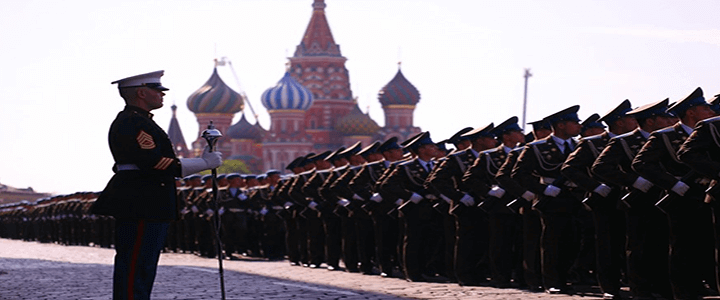Not to sound too alarmist, but… old guys: dust off your Red Army tactics and doctrine manuals. Young guys: find an old guy and ask him about the Soviet menace, and pay attention to your logistics classes. Things might just get hot in Europe.
British Prime Minister Theresa May took a step Monday that no prime minister before her has taken: she openly blamed Russia for an attempted murder on British soil. In doing so, she also, finally, formally laid the blame for the 2006 death of Russian dissident and former spy Alexander Litvinenko on British soil at Russian President Vladimir Putin’s feet.
And she hinted that Britain is taking this most recent incident much more seriously than Putin bargained for.
In her brief speech in the House of Commons, May laid out evidence that the nerve agent attack on former Russian spy and British resident Sergei V. Skripal, and his daughter Yulia, was either “a direct act by the Russian State against our country,” or a case where “the Russian government lost control of this potentially catastrophically damaging nerve agent and allowed it to get into the hands of others.”
Neither situation is pleasant to consider.
A rare and deadly agent
May was confident in making this charge because the nerve agent used in the attack, part of a class of toxins called Novichok agents, is a uniquely Russian weapon. Developed by the Soviet Union in the 1960s and 1970s, the Novichok class of nerve agents is, in the words of an Army Chemical Corps officer I spoke to, “the deadliest of the agents the Russians developed.”
This officer generally agreed with the online assertions that Novichok agents (from the Russian word for “new guy”) are up to eight times as deadly as VX, the nerve agent the Korean strongman Kim Jong-un used to assassinate his half-brother in a Malaysian airport last year.
The Army drilled a fear of VX into every Cold Warrior. Although it’s been nearly 30 years, I still loathe the memory of training for a “deliberate decontamination” of my tank company, which involved hours in “MOPP 4,” the highest level of chemical protection. VX was the most likely agent we would have faced, we were told.
To think that Novichok agents are worse than VX is truly frightening. If this attack was indeed Novichok (and May insists that the British Defence Science and Technology Laboratory at Porton Down positively identified it as such) it is a miracle that the Skripals, and Detective Sergeant Nick Bailey who responded to where they were found, are all alive.
It also raises the question of why the Russians would risk using such a deadly agent in an attack. As the chemical officer told me, the Skripals “should be dead,” and the slightest miscalculation in administering the agent could have resulted in a catastrophe.
It’s almost as if Putin is daring the West to react. There’s a distinct possibility that we will find out soon.
May is not holding back
Everyone who thinks President Trump is using dangerous rhetoric with the North Koreans should pay attention to what May said Monday. She was as blunt as I’ve ever hear her. Her government had summoned the Russian ambassador, she said, and demanded he deliver an answer by the end of Tuesday. Her language made it seem as though she will invoke NATO Article 5.
May said the UK’s “commitment to collective defence and security through NATO remains as strong as ever in the face of Russian behaviour.” She cited the British unit stationed in Estonia, Britain’s “tough sanctions against the Russian economy,” and the general British commitment to collective security.
“We must now stand ready to take much more extensive measures.,” she told the Commons. She said that her cabinet would “consider in detail the response from the Russian State.” Then she hinted at what might be to come.
“Should there be no credible response, we will conclude that this action amounts to an unlawful use of force by the Russian State against the United Kingdom. And I will come back to this House and set out the full range of measures that we will take in response.”
Call me crazy, but that sounds like a warning order to the other NATO member countries that May will be requesting assistance from the alliance. Article 5 of the North Atlantic Treaty states that an attack on one member country is an attack on all, requiring a collective response. Since the treaty’s ratification in 1949, it has been invoked only once: following the September 11 , 2001 terrorist attacks.
But Russia, in its Soviet incarnation, was the original reason for the treaty, and Russian aggression now may well be the reason for another Article 5 invocation. While there are many steps Britain could take short of invoking Article 5, it does seem as if May is telegraphing that she is setting up the Novichok attack as a casus belli, a justification for war.
Maybe it’s a signal to Putin that she’s serious about how truly unacceptable this attack is. Maybe it’s a signal to the United States that Britain is about to call for reinforcements. Maybe it’s both. But it’s still terrifying to contemplate.



